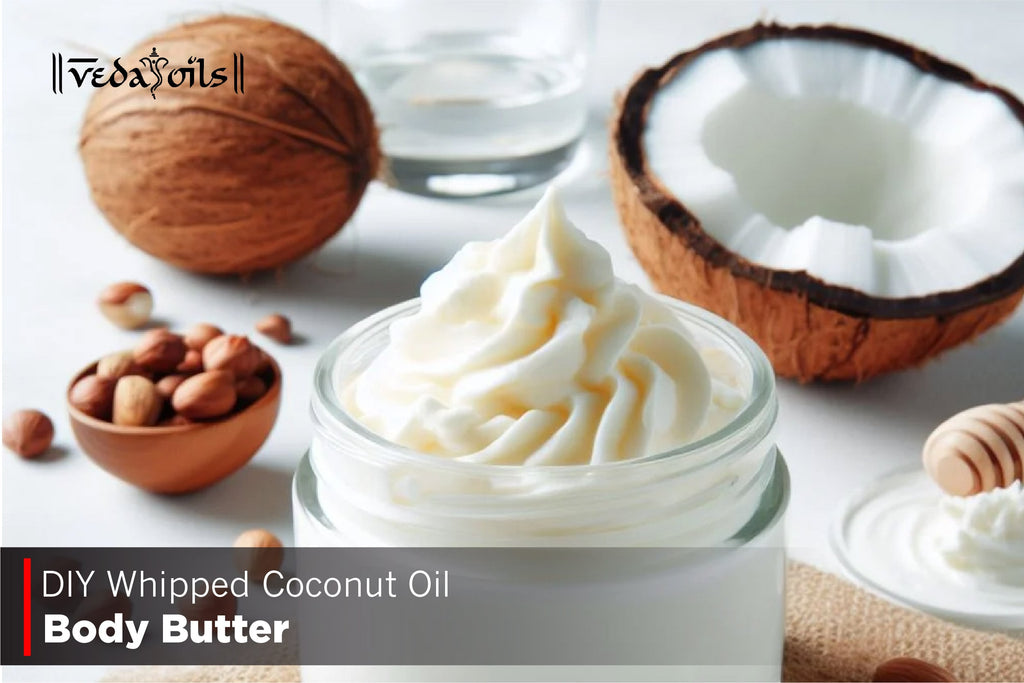Coconut oil and flaxseed oil are two popular oils in the world of natural skincare and hair care. Both oils are rich in essential fatty acids and have been used for centuries to nourish, moisturize, and protect the skin and hair.

However, there are some key differences between these two oils that may affect their benefits for your skin and hair. In this article, we'll explore the differences between coconut oil and flaxseed oil and help you decide which oil is best suited for your skincare and hair care needs. So, let’s read on and know all about these two miraculous oils!
What is Coconut Oil ?
Coconut oil is a natural oil that's extracted from the kernel or meat of mature coconuts harvested from the coconut palm tree. It's a versatile oil that's commonly used in cooking, baking, and as a natural remedy for various health and beauty concerns.

Coconut oil is high in saturated fats, which are believed to provide numerous health benefits such as boosting brain function, improving heart health, and promoting healthy skin and hair. In the world of natural skincare and hair care, coconut oil is a popular ingredient due to its moisturizing and nourishing properties, which can help to hydrate and protect the skin and hair from damage.
What Is Flaxseed Oil?
Flaxseed oil is a natural oil that's extracted from the seeds of the flax plant. It's rich in alpha-linolenic acid (ALA), which is a type of omega-3 fatty acid that's important for overall health and wellness. Flaxseed oil is often used as a dietary supplement to promote heart health, reduce inflammation, and improve digestive health.

It's also commonly used in the world of natural skincare and hair care due to its moisturizing and nourishing properties. Flaxseed oil contains a high concentration of antioxidants, which can help to protect the skin and hair from damage caused by free radicals. Additionally, the essential fatty acids in flaxseed oil can help to improve the appearance of the skin and hair, leaving them looking healthier and more radiant.
Difference Between Coconut Oil And Flaxseed oil
While both coconut oil and flaxseed oil are popular natural oils with moisturizing properties, they differ in terms of their fatty acid composition and potential benefits for the skin and hair.
Coconut Oil VS Flaxseed Oil For Hair
When it comes to hair care, both coconut oil and flaxseed oil can help to nourish and protect the hair, but their properties and benefits may differ based on the individual's hair type and needs.
Coconut Oil For Hair
Coconut oil is a popular choice for hair care due to its many potential benefits. It's rich in fatty acids that can penetrate the hair shaft to moisturize and nourish the hair from within. Coconut oil can help to reduce protein loss from the hair, which can prevent breakage and split ends.

It can also help to improve the overall appearance of the hair by adding shine, reducing frizz, and promoting a healthy scalp. Additionally, coconut oil has antimicrobial properties that may help to prevent dandruff and other scalp issues. Overall, regular use of coconut oil can help to strengthen and protect the hair, leaving it looking and feeling healthier.
Flaxseed Oil For Hair
Flaxseed oil is a nutrient-rich oil that can provide several benefits for hair health. It contains high levels of alpha-linolenic acid (ALA), which is a type of omega-3 fatty acid that's important for maintaining healthy hair growth. Flaxseed oil can help to strengthen the hair shaft, prevent breakage and split ends, and promote overall hair health.

It's also rich in antioxidants, which can help to protect the hair and scalp from damage caused by free radicals. Additionally, flaxseed oil can help to improve scalp health by reducing inflammation and promoting healthy blood flow to the scalp. Overall, incorporating flaxseed oil into your hair care routine can help to promote strong, healthy, and shiny hair.
Coconut Oil vs Flaxseed Oil For Skin
Both coconut oil and flaxseed oil have moisturizing and nourishing properties that can benefit the skin. However, their fatty acid composition and potential benefits may vary based on the individual's skin type and concerns.
Coconut Oil For Skin
Coconut oil is a popular natural ingredient in skin care products due to its many potential benefits for the skin. Its high concentration of fatty acids, including lauric acid, can help to moisturize and nourish the skin, leaving it feeling soft and supple. Coconut oil also has antimicrobial properties, which can help to prevent bacterial and fungal infections on the skin.

It may also help to reduce inflammation and soothe irritated skin, making it a great choice for those with sensitive skin. Additionally, coconut oil can be used as a natural makeup remover, and it may help to improve the appearance of scars and stretch marks over time. Overall, coconut oil can be a versatile and effective addition to your skincare routine.
Flaxseed Oil For Skin
Flaxseed oil is a nutrient-rich oil that can provide several benefits for the skin. It's a rich source of alpha-linolenic acid (ALA), which is a type of omega-3 fatty acid that's important for maintaining healthy skin. Flaxseed oil can help to improve skin hydration, elasticity, and firmness, and may also help to reduce the appearance of fine lines and wrinkles.

It has anti-inflammatory properties that can help to soothe irritated and inflamed skin, making it a great choice for those with eczema or psoriasis. Flaxseed oil can also help to protect the skin from damage caused by free radicals and UV radiation, due to its high antioxidant content. Overall, incorporating flaxseed oil into your skincare routine can help to promote healthy, radiant, and youthful-looking skin.
Coconut Oil VS Flaxseed Oil - Which Is Better?
Determining whether coconut oil or flaxseed oil is better depends on the intended use and individual preferences. Both oils have their unique properties and potential benefits for skin and hair. Coconut oil is generally considered to be a better option for hair care due to its ability to penetrate the hair shaft and prevent protein loss, while also providing moisture and nourishment to the hair.

It can help to improve the texture and shine of hair and has been used traditionally as a hair treatment. Flaxseed oil, on the other hand, is rich in omega-3 fatty acids and antioxidants, making it a better option for skincare. It can help to improve skin hydration, reduce inflammation, and protect the skin from damage caused by free radicals.
Conclusion
In conclusion, both coconut oil and flaxseed oil have their unique properties and potential benefits for skin and hair. While coconut oil is generally considered to be a better option for hair care, flaxseed oil is rich in omega-3 fatty acids and antioxidants, making it a better option for skincare. You can purchase both the oils from VedaOils and see what works for you best!
Frequently Asked Questions
Here are some frequently asked questions about Coconut Oil VS Flaxseed Oil:
Q. Is grapeseed oil or coconut oil better for you?
Ans. Determining whether flaxseed oil or coconut oil is better for you depends on your individual needs and preferences.
Q. which is better coconut oil or flaxseed oil?
Ans. Both the oils are equally beneficial for hair and skin health. You should try out both and see which one works for you.












 Sign in
Sign in Register now
Register now My Reward Points
My Reward Points









